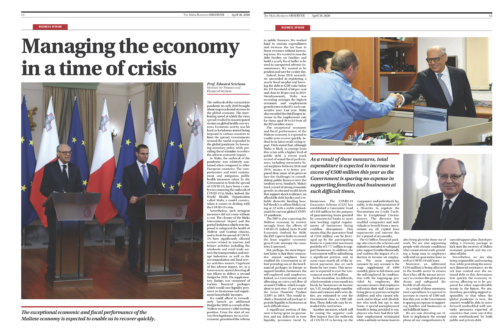The outbreak of the Coronavirus pandemic in early 2020 has brought about unprecedented stresses to the global economy. The unrelenting speed at which the virus spread resulted in unanticipated strains on global health care systems. Economic activity was hardly hit as lockdowns started being imposed in various countries to limit the spread. The Governments around the world responded to the global pandemic by loosening monetary policy while providing fiscal stimulus to reduce the adverse economic impact.
As a result of these measures, total expenditure is expected to increase in
excess of €500 million this year as the Government is sparing no expense in
supporting families and businesses at such difficult times.
In Malta, the outbreak of the pandemic was relatively contained when compared to other European countries. The comprehensive and strict containment and mitigation public health measures taken by the Government to limit the spread of COVID-19, has been a catalyst in containing the outbreak of COVID-19 in Malta. Indeed, the World Health Organisation called Malta, a model country, when it comes to dealing with the COVID-19 crisis.
Nevertheless, such stringent measures did not come without a cost. The closure of the Malta International Airport and the partial-lockdown which were imposed to safeguard the health of Maltese and Gozitan citizens and limit the spread of COVID-19, has significantly affected sectors related to tourism and leisure activities including the wholesale and retail trade sector, the transportation and storage and the accommodation and food service activities sector. Cognisant of this adverse impact, we as a Government, started directing all our efforts to deliver a second Budget for 2020. The supplementary Budget was composed of various financial packages which would ease liquidity pressures on businesses and supplement households’ incomes.
We could afford to immediately launch an additional Budget for 2020 as a result of the Maltese economy’s solid starting position. From the start of our very first legislature, we as a Government prioritised the reform in public finances. We worked hard to contain expenditures and increase the tax base to boost revenues without increasing taxes. We wanted to ease the debt burden on families and build a yearly fiscal buffer to be used in unexpected adverse circumstances. We wanted to be prudent and save for a rainy day.
Indeed, from 2016 onwards, we succeeded in registering a yearly fiscal surplus and lowering the debt-to-GDP ratio below the EU threshold of 60 per cent and close to 40 per cent in 2019. Simultaneously, Malta was recording amongst the highest economic and employment growth rates in the EU, each consecutive year. Last year, Malta also recorded the third largest increase in the employment rate for those aged 20 to 64 from all the EU member states.
The exceptional economic and fiscal performance of the Maltese economy is expected to enable us to recover quickly. Indeed in its latest credit rating report, Fitch stated that although Malta is likely to emerge from this crisis with a higher level of public debt, a recent track record of sound fiscal performance, including consecutive fiscal surpluses between 2016 and 2019, means it is better prepared than some of its peers to face the challenges in consolidating public finances over the medium-term. Similarly, Malta’s track record of strong economic growth, its elevated wealth levels that support shock resilience, an affordable debt burden and a reliable domestic funding base, led Moody’s to affirm Malta’s rating at A2 with a stable outlook, amid the current global COVID-19 pandemic.
The IMF are also expecting the Maltese economy to recover strongly from the effects of COVID-19. Indeed, in its World Economic Outlook, for 2020, the IMF expects Malta to record the least negative economic growth rate amongst the countries it assessed.
But perhaps the most important factor is that these consecutive annual surpluses has enabled the Government to afford providing amongst the best financial packages in Europe to support families, businesses, the self-employed and employees. Indeed, as a Government, we are allocating an extra cash flow of around €2 billion, which is equivalent to just over 15% of the Gross Domestic Product (GDP) in 2019. This would include a financial aid package to provide liquidity to businesses at such difficult times.
A significant portion of this sum is being spent on guarantees and tax deferrals to ease liquidity pressures faced by businesses. The COVID-19 Guarantee Scheme (CGS) has established a Guarantee Fund of €350 million for the purpose of guaranteeing loans granted by commercial banks to meet new working capital requirements of businesses facing cashflow disruptions. This means that the guarantee fund of €350 million can be leveraged up by the participating banks to a potential maximum portfolio of €777 million to support businesses. In addition, the Government will be subsidising a significant portion, and in some cases nearly all, of the interest payments due on such loans for two years. This measure is expected to cost the Government, nearly €40 million.
In the meantime, Tax Deferrals, which constitute a two-month tax break for businesses on income tax, VAT, social security contributions and customs and excise duties, are estimated to cost the Government close to €200 million. These deferrals may be extended if the need arises.
Another measure which will be easing the negative cash flow impact that the outbreak of COVID-19 is having on the companies’ and individuals’ liquidity, is the implementation of a Directive, to regulate the Moratorium on Credit Facilities in Exceptional Circumstances. The Directive has enabled companies and individuals, to benefit from a moratorium on all capital loan repayment and interest due for a period of six-months.
The €2 billion financial package also covers the schemes and initiatives intended to safeguard jobs, support families financially and cushion the impact of a reduction in income on employees. The most important measure by any account is the wage supplement of €800 monthly given to full time and the self-employed. In combination with the topping-up provided by employers this measure ensures that employers will retain their staff. Grants are being given to parents caring for children and who cannot telework and to persons with disability who work but opt to stay home. A special unemployment benefit is being provided to employees who have had their full-time employment terminated while a subsidy on home loans is also being given for those out of work. We are also supporting persons with chronic conditions who cannot attend work and providing a lump sum to employers with staff on quarantine leave.
An additional €150 million is being allocated to the health sector to ensure that it has all the means necessary to combat this global pandemic and safeguard the health of all citizens.
As a result of these measures, total expenditure is expected to increase in excess of €500 million this year as the Government is sparing no expense in supporting families and businesses at such difficult times.
We are now directing our efforts to implement the second phase of our comprehensive financial support plan, that of providing a recovery package to kick-start the recovery of Malta’s economic growth and the creation of jobs.
Nevertheless, we are also being responsible and ensuring that while providing the necessary financial assistance, we do not lose control over the National debt as this determines how much the economy recovers quickly and be prepared for other unpredictable events in the future. We are therefore providing support responsibly so that when the global pandemic is over, the country would be able to move forward unshackled with austerity measures expected of countries who come out of this crises overburdened by both public and private debt.

30th April 2020
